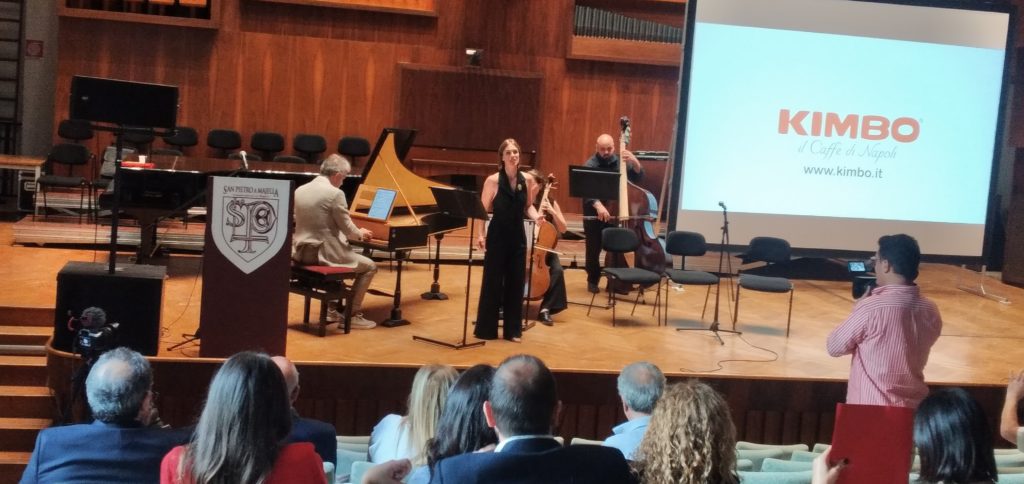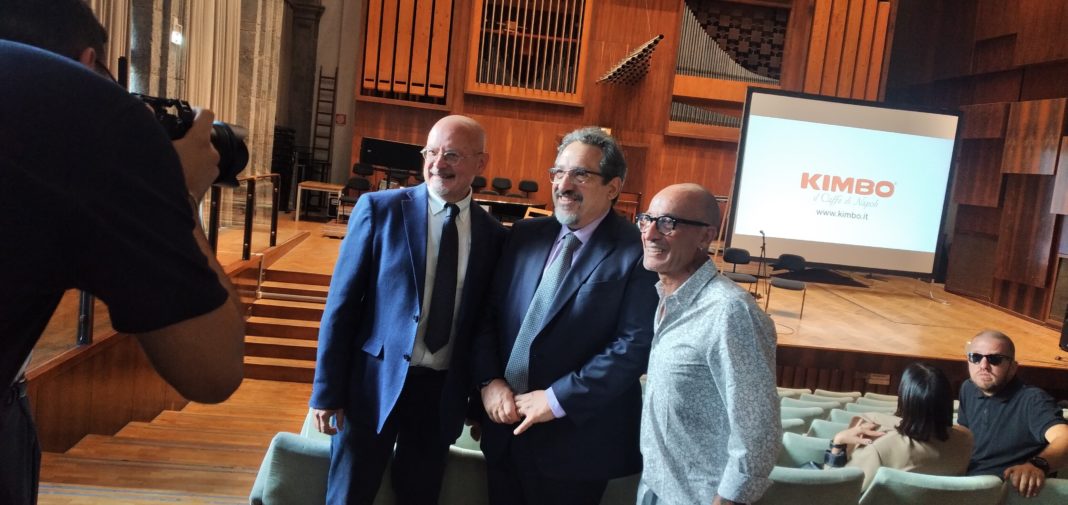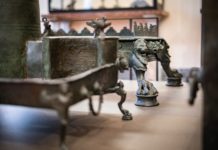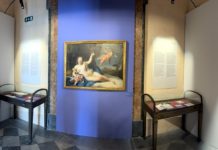Da ragazzo sognava di studiare al Conservatorio di San Pietro a Majella. Guardava (incantato) in tv l’orchestra di Sanremo e per caso , da spettatore della Domenica in di Pippo Baudo, scoprì che i musicisti erano quasi tutti docenti della prestigiosa istituzione napoletana.
Ma, lui, nato e cresciuto nei Quartieri Spagnoli questo sogno lo ha dovuto mettere da parte: non c’era le possibilità economiche per realizzarlo. Comunque il suo posto nella musica, con tenacia e passione, se l’è conquistato fino a veder il suo brano Malatia (etichetta Time records) certificato come disco d’oro dalla federazione italiana della musica.

Percussionista che scuote le emozioni di chi ascolta e scrive testi a 4 mani con il rapper Lucariello, ne ha appena realizzato uno con videoclip tra il rione Sanità e Scampia per celebrare i 60 del noto marchio napoletano Kimbo: nel filmato, coinvolti nel balletto a ritmo d’ O kafè, dallo storico jingle aziendale lanciato nel 1988, tutti i dipendenti dell’impresa partenopea. Dalle 10 di domenica 1 ottobre, Coffee day in tutto il mondo, sarà diffuso su tutte le principali piattaforme musicali.
Com’è nato, il musicista lo ha spiegato stamattina, nella magnifica sala Scarlatti del Conservatorio, insieme insieme a Mario Rubino che presiede la Kimbo spa, illustrando anche il progetto delle borse di studio che affianca l’iniziativa.
Lui e Kimbo offriranno un primo fondo di 12mila euro (diviso in parti uguali) per due borse di studio di 6mila euro, destinate all’anno che parte adesso (2023/24), per offrire la possibilità a chi non ce l’ha di studiare nel tempio internazionale della musica. E poi altre 4 borse di studio di 5mila euro l’una, per un totale di 20mila euro, affidati al Conservato, per gli altri 4 anni successivi.
«Io non ho potuto farlo ma ho voluto offrire l’opportunità a qualcuno altro di accedervi», racconta con semplicità Merolla come se fosse ovvio (e dovrebbe esserlo) che tutti possono essere utili, tendendo una mano a chi insegue progetti e non può realizzarli perché non ha nessun sostegno.
Anche in questo affiancato da Rubino che non è solo un imprenditore ma anche un batterista da sempre innamorato della musica. A metterli in contatto tra loro, il presidente del Conservatorio, Luigi Carbone, incontrato dopo 40 anni a una nostalgica cena tra antichi compagni di classe.
Un progetto per il cambiamento di Napoli attraverso l’arte, che parte da lontano. Da quel bar alla Sanità dove la miscela che è ormai un brevetto identitario della città si formò negli anni cinquanta, mettendo alla prova il palato dei clienti, anche quello nobile di Totò che in quel quartiere aveva le proprie radici. Da lì, si sviluppò prima una piccola torrefazione e poi si camminò a passo veloce verso lo stabilimento di Melito nel 1963.
Sessant’anni dopo ecco ‘O kafè cantato da Ciccio Merolla. Me sceto ‘na matina e già te voglio a tt/e M’incontro cu’ n’amico, jammo cercanno a tte/ Ma ccà nun se fatica si tu nun staje cu’ mme/ Po’ mangio e nun m’aizo e tu già sai pecché/ Chesta è ‘na poesia che sape ‘e cafè.
Mario Rubino spera che diventi il nuovo tormentone di Natale.
GUARDA IL VIDEO
Project/ Ciccio Merolla sings ‘O kafè for Kimbo’s 60th anniversary. And with the Neapolitan company offers a scholarship (for 5 years) to students attending the Conservatorio di San Pietro a Majella
As a boy he dreamed of studying at the San Pietro a Majella Conservatory. He watched (enchanted) the Sanremo Orchestra on television and, while watching Pippo Baudo’s Domenica in, he happened to notice that the musicians were almost all professors at the prestigious Neapolitan institution.
But he, born and raised in the Quartieri Spagnoli, had to put aside this dream: there was no economic possibility to realize it. However, his place in music, with tenacity and passion, he won it until he saw his song Malatia (Time Records label) certified as a gold record by the Italian Music Federation.
A percussionist who stirs the emotions of the listener and writes lyrics four-handed with rapper Lucariello, he has just done one with a video clip between the Sanità district and Scampia to celebrate the 60th anniversary of the famous Neapolitan brand Kimbo: in the film, involved in dancing to the rhythm of d’ O kafè, from the historic company jingle launched in 1988, are all the employees of the Neapolitan company. From 10 a.m. Sunday, October 1st, World Coffee Day, it will be broadcast on all major music platforms.
How it was born, the musician explained this morning in the magnificent Scarlatti Hall of the Conservatory, together with Mario Rubino, chairman of Kimbo spa, also illustrating the scholarship project that accompanies the initiative.
He and Kimbo will offer an initial fund of 12 thousand euros (divided equally) for two scholarships of 6 thousand euros, designated for the year starting now (2023/24), to offer the opportunity to those who do not have it, to study in the international temple of music. And then four other scholarships of 5 thousand euros each, for a total of 20 thousand euros, entrusted to the Conservatory, for the other four following years.
“I couldn’t do it, but I wanted to give someone else the opportunity to have access to it,” Merolla says with simplicity, as if it were obvious (as it should be) that everyone can be useful, giving a hand to those who have projects and cannot realize them because they have no support.
Rubino, who is not only a businessman but also a drummer who has always been in love with music, is also involved. They were brought together by the president of the Conservatory, Luigi Carbone, whom Rubino met after 40 years at a nostalgic dinner among old classmates.
A project for the transformation of Naples through art, starting from afar. From the bar in Sanità, where in the fifties the blend was created that is now a trademark of the city, testing the palates of customers, including the noble Totò, who had his roots in that district. From there, first a small roasting facility was developed and then, in 1963, it went quickly to the establishment of Melito.
Sixty years later, here is ‘O kafè sung by Ciccio Merolla. Me sceto ‘na matina e già te voglio a tt/e M’incontro cu’ n’amico, jammo cercanno a tte/ Ma ccà nun se fatica si tu nun staje cu’ mme/ Po’ mangio e nun m’aizo e tu già sai pecché/ Chesta è ‘na poesia che sape ‘e cafè.
Mario Rubino hopes that this will be the new Christmas hit.










